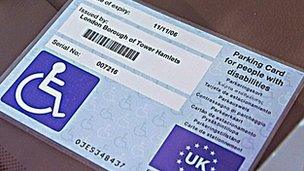Blue badge parking measures introduced to combat fraud
- Published
- comments

There are an estimated 2.5 million blue badges in circulation nationally.
Measures to crack down on drivers who abuse the disabled parking system will come into force in England and Scotland from 1 January.
There are an estimated 2.5 million blue badges in circulation, allowing drivers to park on yellow lines as well as avoid parking and congestion charges.
But blue badge fraud is estimated to cost the UK £46m a year.
New badges will have added security features and the method to determine people's eligibility is being improved.
It is hoped the redesign will make blue badges harder to forge or alter.
Transport Minister Norman Baker said: "Motorists who pretend to be disabled to get some free parking are frankly disgraceful".
"They prevent real blue badge holders from using parking bays designed for those genuinely in need and they cheat the vast majority of road users who play fair when they park their cars."
'Abuse and misuse'
Previously, blue badges were made from card and hand written, but from 1 January disabled drivers will be able to apply for an electronically printed badge, much like a driving licence.
It will have a unique hologram, digital photo and serial number allowing parking attendants to check for genuine badges more easily through the windscreen.
Transport Minister Norman Baker: "This is a hi-tech new badge... If anyone's thinking of forging it, forget it"
Mr Baker said: "Our new blue badge will be as secure as a banknote and anyone thinking of faking it can forget it.
"We are also tightening up on enforcement and eligibility so there will be no way to scam the system."
Another measure being introduced from 1 January is the ability for badge holders to apply for renewals online.
The changes will see local authorities gain more powers to seize badges they think are being misused and tests for eligibility will be run by councils rather than GPs.
Scotland's Transport Minister Keith Brown said the system had been "open to abuse and misuse by far too many".
He said: "This causes real day-to-day problems for those genuine users of the scheme who need the use of disabled spaces but find them taken up, often by vehicles displaying fake or misused badges.
"We want to make sure that these crucially important parking places are used for the purpose for which they were intended - to help severely-disabled people retain their independence and live full lives."
Lisa Egan, a disabled driver, and Paul Slowey, a blue badge fraud investigator explain the extent of blue badge fraud
Helen Dolphin, director of policy and campaigns at Disabled Motoring UK, said: "After years of campaigning for improvements to the blue badge scheme, I'm delighted that changes that make the scheme fit for the 21st Century have been introduced."
Anne MacLean, convener of the Mobility and Access Committee for Scotland, also welcomed the changes.
She said: "The blue badge is an essential service for disabled people and this package of reforms to help prevent abuse, protect the parking rights of genuine badge holders and provide a more consistent and uniform approach is great news."
The scheme, which was introduced in the early 1970s, operates throughout the UK and is managed by local authorities. It differs slightly in England, Scotland, Wales and Northern Ireland.
The new blue badge is expected to be introduced in Wales in April 2012. Northern Ireland is retaining the old-style badge for the time being.
- Published8 December 2011
- Published14 February 2011
- Published28 March 2011
- Published16 February 2011